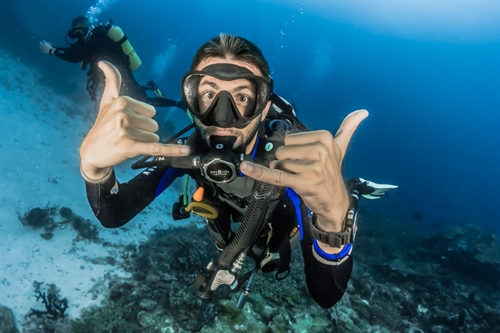As any diver knows, the sport involves a fair bit of gear, some of which can be pricy to replace. Storing it in ideal conditions will prolong its life and keep you safe.
Wash and dry your diving equipment before storing
Storing your scuba gear clean and dry will protect it from damage by corrosive salt. It will also prevent the growth of mould and bacteria.
Washing and drying your diving equipment lets you check it over for damage so you can attend to repairs sooner rather than later. There’s nothing worse than having a day in the water cancelled by broken kit; and in a worst case scenario, damaged equipment could put you at risk.
How should I store diving fins?
Diving fins and flippers are best hung up so they don’t crease. Creases and bends in flippers can ruin their fit.
How to store diving masks and snorkels
Changes of temperature and humidity can affect the lining on masks and snorkels, shortening their useful life, so find a place with a constant environment.
What’s the best way to store a regulator?
Keep regulators in a cool, dark space that doesn’t experience extremes of temperature. If you know you’re putting your regulator away for a few months, get it serviced first. Store a regulator dry, with the tubes straight and with the dust cap in place.
Can I keep scuba tanks in my storage unit?
Many storage companies won’t let you keep pressurised containers – including diving tanks – in your storage unit. But do ask, as some storage companies can accommodate diving tanks if need be.
It’s fine to store scuba tanks in a shed or garage – but treat them with care with transporting them and get them regularly serviced.
Experts recommend storing diving tanks at 200 psi, rather than completely empty or full.
How should I store a neoprene wetsuit or a dry suit?
Neoprene breaks down under UV light, so a dark storage place is really important for wet and dry suits. Dry suits in particular tend to have latex seals that are prone to damage in extremes of temperature, as the British Sub-aqua Club explains.
Always wash and dry neoprene suits before storage. Make sure zips and valves are working properly, and repair them if not. You could hang them on a garment rail, as storing them folded may leave creases. It’s particularly important to avoid bending or creasing a wetsuit across the zip.
Putting a buoyancy control device (BCD) into storage
BCDs are prone to mould, so store your BCD clean and dry. You can inflate it slightly to prevent the bladder walls from sticking together.
A storage solution with a controlled environment
Self-storage with a controlled environment has many advantages for sub-aqua equipment. So consider using a self-storage unit to free up space at home and protect your diving kit from heat and cold.
Will my stored diving equipment be insured?
Most storage companies require you to insure the contents of your lock-up, including any diving gear you might be storing. Some storage companies include insurance in the monthly bill; but you don’t have to take their insurance quote. You may be able to make savings by using another insurer, like Store and Insure – get a quick quote from Store and Insure to see if you can save on your storage insurance.



